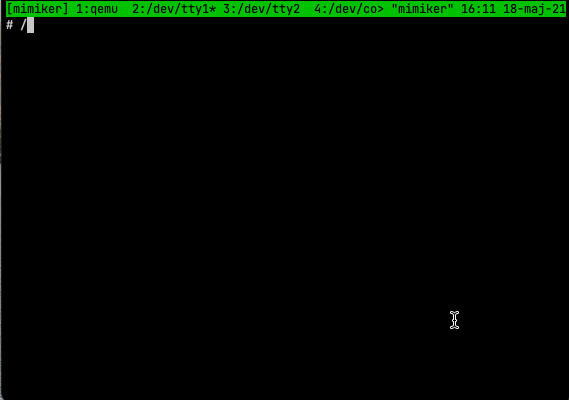Mimiker's main goal is to deliver minimal Unix-like operating system, i.e. the kernel and a set of userspace programs.
Kernel design is heavily inspired by FreeBSD & NetBSD systems with some ideas taken from Linux, Plan9 and other OSes. We spend a lot of time reading source code of open-source operating systems. We carefully choose their best design decisions, ideas, algorithms, APIs, practices and so on, distill them to bare minimum and reimplement them or adapt to Mimiker code base. We hope not to repeat their mistakes and move away from legacy and non-perfect solutions.
Mimiker project gathers like minded people who value minimalism, simplicity and readability of code. We strive for the lowest possible complexity of solutions. We love to throw away code that isn't terribly useful or handles rare edge cases. We know value of debuggability and we don't hesitate to spend time writing tools that help to improve it.
Though userspace programs are part of Mimiker project, they've got simply ported from NetBSD or suckless project. We focus on kernel development, since we find it more interesting. We don't want to invest too much time into the device drivers, so we keep a list of target platforms small.
If you'd like to get involved in the project please read our Wiki to find out more!
Mimiker is a real-time operating system. The kernel is preemptible and our mutexes support priority inheritance. We minimize work done in interrupt context by delegating it to interrupt threads instead of running it using soft interrupts.
Mimiker runs on MIPS (32-bit), AArch64 and RISC-V (both 32-bit and 64-bit) architectures under QEmu and Renode control.
Mimiker has nice set of debugging tools: gdb scripts written in Python, Kernel
Address Sanitizer, Lock dependency validator, Kernel Concurrency Sanitizer. We
even have support for profiling the kernel using gprof! We use Clang to
compile our code base, hence we can employ sophisticated dynamic and static
analysis algorithms to aid code reliablity.
A common set of synchronization primitives is provided, i.e. spin-locks, mutexes and conditional variables - all with simple semantics. We don't have multiple primitives that do similar things, but a little bit differently, which is common for FreeBSD or Linux kernels.
Mimiker's kernel memory is wired (i.e. non-swappable), so you don't have to worry about choosing right locks when accessing kernel memory, unlike in FreeBSD. We have buddy memory allocator for physical memory, virtual address space allocator and slab allocator based on Magazines and Vmem paper. Our memory allocators are simple yet efficient.
Mimiker's driver infrastructure abstracts away concept of hardware register and interrupts in similar manner to FreeBSD's NewBus. Special care is taken to make drivers portable. We have enumerator routines that autodetect devices attached to PCI and USB buses. We use flat device tree to drive kernel configuration during startup phase.
Virtual file system and user virtual address space management are loosely based on FreeBSD ideas. They need substatial amount of work to become as mature as in FreeBSD or Linux kernels.
We have over eighty syscalls that allow us to run various open-source tools, including NetBSD's Korn Shell, Atto Emacs editor, Lua interpreter, and many more. We even have a game:
Mimiker supports:
- UNIX file I/O -- well known APIs for file-like objects access,
- interprocess communication -- POSIX signal and pipes,
- job control -- thus we can run unmodified Korn Shell,
- UNIX credentials -- users, groups, file permissions,
- libterminfo, hence Mimiker can run some fullscreen terminal applications,
- pseudoterminals -- so we can run script or terminal emulators.
We would like to support:
- multi-core systems,
- VirtIO and virt platforms in QEmu,
- a filesystem for non-volatile storage devices,
- TCP/IP protocols.
There's plenty of work to be done. Please refer to our roadmap!
